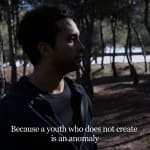Bouchra Khalili Morocco, 1975
Garden Conversation, 2015
Digital film, HD, color, sound.
20'
Edition 1 AP of 1 + 2 AP
Más imágenes
Garden Conversation. Digital Film. 17’. 2014. Commissioned by Abraaj Group Art Prize, 2014. Garden Conversation takes as a departure point an historical fact reported by many accounts, but that has...
Garden Conversation. Digital Film. 17’. 2014. Commissioned by Abraaj Group Art Prize, 2014.
Garden Conversation takes as a departure point an historical fact reported by many accounts, but that has not been documented: the meeting in Cairo in January 1959 at the Embassy of Morocco of Ernesto Guevara and the old exiled Moroccan hero of the Rif War (1921-1926 ), Abdelkrim Al Khattabi (Ajdir, Northern Morocco, 1882 ; Cairo, 1963). A precursor of the anti-colonial struggle, Al Khattabi fought two colonial armies (France and Spain), and invented and experimented modern methods of Guerilla warfare that inspired many anti-colonial leaders as Ho Chi Minh and Ernesto Guevara.
55 years after Guevara and Khattabi's meeting, and nearly 3 years after the beginning of the Arab Spring, Khalili examine a hypothesis in the form of a poetic meditation: what the ghosts of Guevara and Khattabi would tell to each other if they were meeting today?
The artist takes inspiration both from Walter Benjamin’s «On the Concept of History» and from the «Hauntology» as Jacques Derrida defined it in his «Spectres of Marx» (1993), to approach history as a constellation of traces of the past haunting the present-time to inform it, and eventually opening up a window on the perception of a potential future.
For Garden Conversation, Khalili proceeds to a series of displacements in terms of history, geography, language, and visual approach, to build up the apparatus for her hypothesis:and what if a young Arab man and a young Arab woman would meet, literally embodying the words of Guevara and Khattabi, to engage in a conversation about struggle, its means and its purpose?
And what if each of them would speak in his/her own language - Moroccan Arabic and Iraqi Arabic - and yet fully understand each other?
And what if they meet in one of the still oldest colonial possessions in the world - Melilla, in the Moroccan Rif - where Khattaabi lived, was imprisoned, and became a revolutionary?
And what if this conversation takes place in a heteropian space - mid- garden, mid- forest - bordered on one side by a Spanish military training camp, on the other by the sea, and finally by a barrier, isolating the city of the Moroccan territory, and serving for nearly twenty years to prevent migrants to reach this piece of Europe on the African continent?
This poetic hypothesis aims to suggest a reflection on the modes of resonance of history, based on a visual approach articulating documentary and theatrical distancing effect, language and geography, to show ghosts of flesh and blood, determinated to haunt the present-time.
Garden Conversation takes as a departure point an historical fact reported by many accounts, but that has not been documented: the meeting in Cairo in January 1959 at the Embassy of Morocco of Ernesto Guevara and the old exiled Moroccan hero of the Rif War (1921-1926 ), Abdelkrim Al Khattabi (Ajdir, Northern Morocco, 1882 ; Cairo, 1963). A precursor of the anti-colonial struggle, Al Khattabi fought two colonial armies (France and Spain), and invented and experimented modern methods of Guerilla warfare that inspired many anti-colonial leaders as Ho Chi Minh and Ernesto Guevara.
55 years after Guevara and Khattabi's meeting, and nearly 3 years after the beginning of the Arab Spring, Khalili examine a hypothesis in the form of a poetic meditation: what the ghosts of Guevara and Khattabi would tell to each other if they were meeting today?
The artist takes inspiration both from Walter Benjamin’s «On the Concept of History» and from the «Hauntology» as Jacques Derrida defined it in his «Spectres of Marx» (1993), to approach history as a constellation of traces of the past haunting the present-time to inform it, and eventually opening up a window on the perception of a potential future.
For Garden Conversation, Khalili proceeds to a series of displacements in terms of history, geography, language, and visual approach, to build up the apparatus for her hypothesis:and what if a young Arab man and a young Arab woman would meet, literally embodying the words of Guevara and Khattabi, to engage in a conversation about struggle, its means and its purpose?
And what if each of them would speak in his/her own language - Moroccan Arabic and Iraqi Arabic - and yet fully understand each other?
And what if they meet in one of the still oldest colonial possessions in the world - Melilla, in the Moroccan Rif - where Khattaabi lived, was imprisoned, and became a revolutionary?
And what if this conversation takes place in a heteropian space - mid- garden, mid- forest - bordered on one side by a Spanish military training camp, on the other by the sea, and finally by a barrier, isolating the city of the Moroccan territory, and serving for nearly twenty years to prevent migrants to reach this piece of Europe on the African continent?
This poetic hypothesis aims to suggest a reflection on the modes of resonance of history, based on a visual approach articulating documentary and theatrical distancing effect, language and geography, to show ghosts of flesh and blood, determinated to haunt the present-time.
8
de
27






